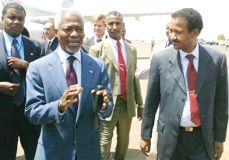US calls on Annan to travel to Sudan on Darfur
By Evelyn Leopold
UNITED NATIONS, Dec 21 (Reuters) – The United States called on Secretary-General Kofi Annan on Tuesday to visit Darfur again and the U.N. leader said the Security Council should consider new steps, such as sanctions, to stop violence in Sudan’s troubled western region.
 Violence is escalating in the vast arid area, with relief convoys attacked and peace talks stalled while 1.8 million people are homeless. The Africa Union is deploying monitors and troops but is still far short of the 3,300 personnel expected.
Violence is escalating in the vast arid area, with relief convoys attacked and peace talks stalled while 1.8 million people are homeless. The Africa Union is deploying monitors and troops but is still far short of the 3,300 personnel expected.
Some 70,000 people in Darfur have died since March from disease and hunger, U.N. agencies say.
“We will be engaging with the secretary-general on what steps the Security Council might take,” U.S. representative Stuart Holliday told reporters after council consultations.
“I also think it might be time for him to actually personally see the situation in Darfur again as he did last summer,” Holliday said, adding that he had not spoken to Annan about it. The secretary-general’s last trip resulted in new agreements for humanitarian access.
Annan said at a year-end news conference it was time to examine new measures including sanctions against perpetrators of crimes. The Security Council had threatened targeted sanctions, but members Russia, China and others oppose implementing them.
“I think the proposals on the table should be looked at very seriously by the council,” Annan said in answer to questions. “I think we are at that point now.”
“There comes a time when you have to make a reassessment as to whether the approach you have taken is working or not. And if it is not working, what other measures do you take?,” Annan said. “The council has talked of sanctions in the past.”
Algerian Ambassador Abdullah Baali, this month’s council president, told reporters the 15-member body was ready “to consider a full range of options to exercise pressure on the parties” and was “deeply concerned at the serious degradation of the security and humanitarian situation.”
But he gave no specifics.
The crisis in Darfur was sparked in February 2003 when two rebel groups took up arms against the government in a struggle over power and scarce resources. Khartoum retaliated by arming militia, accused of conducting a campaign of murder, rape and arson against villagers.
CRIMINAL COURT
Another alternative council members have discussed is a referral to the International Criminal Court, whose existence the Bush administration vigorously opposes.
“A majority of the council members would want the ICC to play a role, but we also know that the United States has a problem with any referral to the ICC,” Annan said.
“This is an issue the council will have to find a way around, but I think those who are perpetrating these crimes must not be allowed to get away, and impunity must not be allowed to stand,” he added.
The United Nations is expected to release a report on violence in Darfur before the end of January that will probably include names of suspected perpetrators. The report would also evaluate whether genocide has taken place there.
After that, European diplomats say they are headed for a showdown with the Bush administration in the Security Council about how to prosecute perpetrators of atrocities in Darfur if the ICC alternative is disregarded.
The Hague-based ICC came into existence a year ago as the first permanent global criminal court to try individuals for genocide, war crimes and massive human rights abuses.
But the Bush administration opposes the court, arguing that U.S. soldiers could be the target of frivolous prosecutions.
